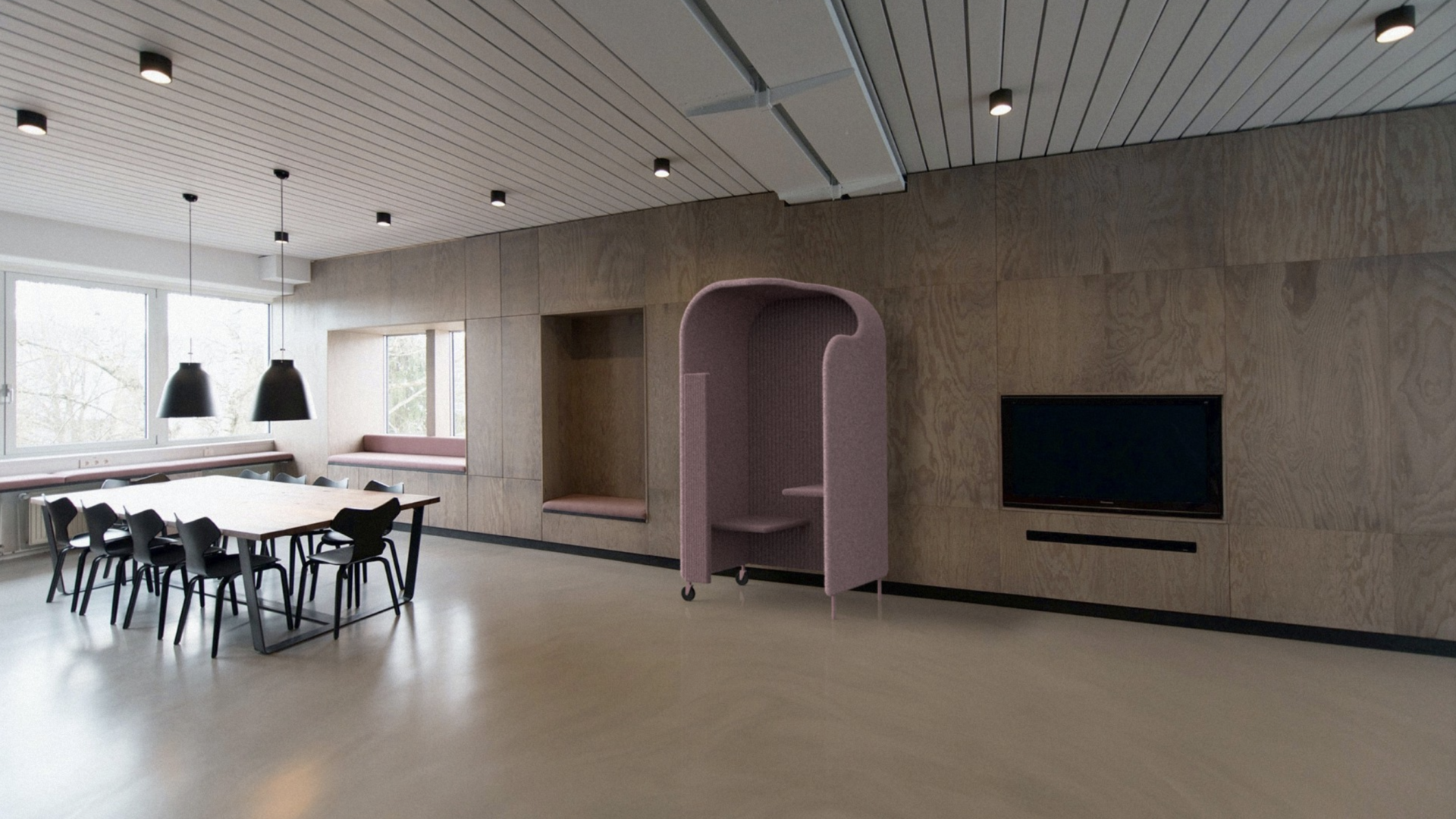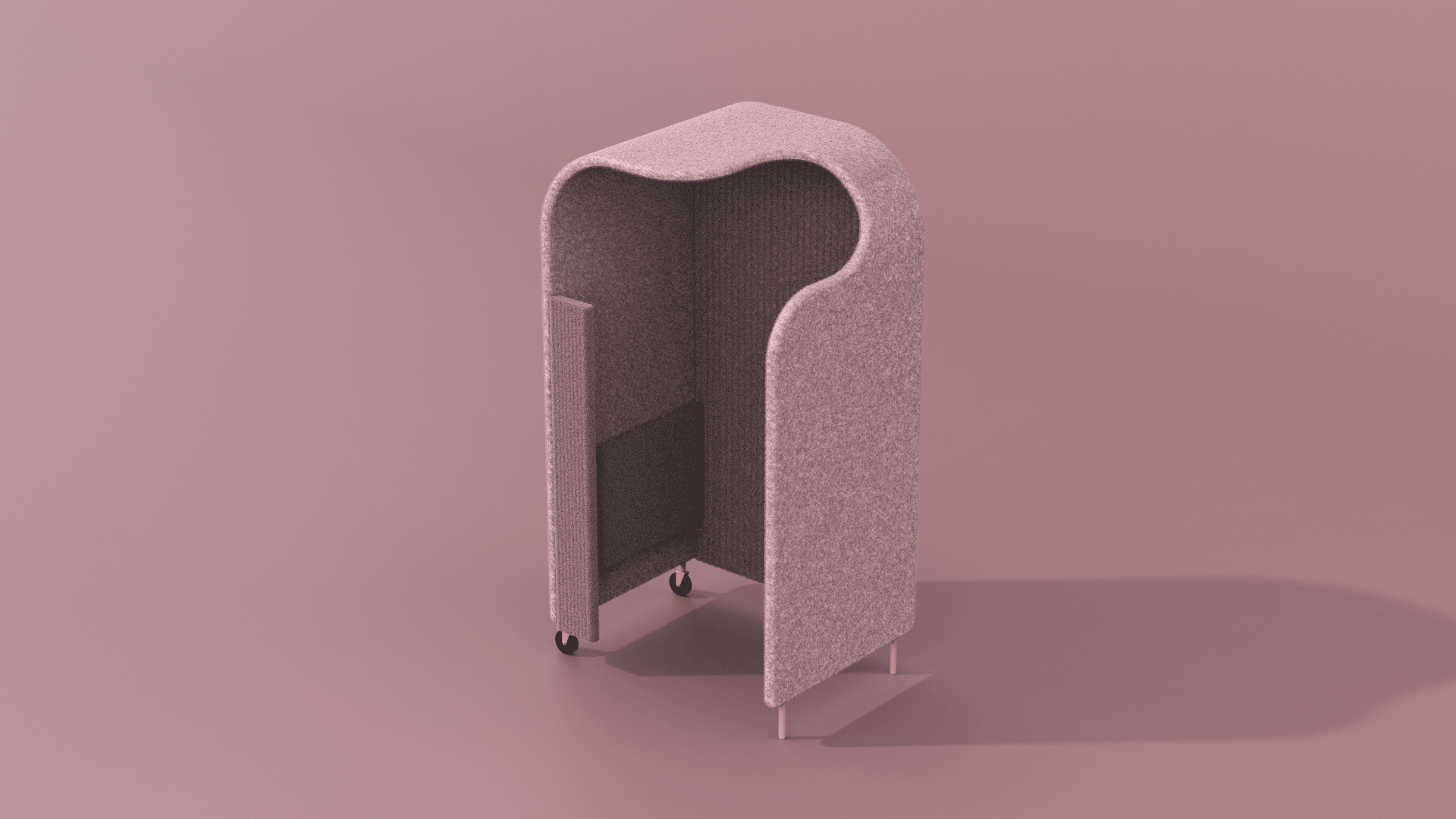Designing for
Workplace Wellness
 Read Below
Read Below
 Read Below
Read Below
Rendering created by the Pophouse team
Designing for
Workplace Wellness
The subject of this week’s Future of Work article is designing for physical and psychological wellness in the workplace, a topic we feel merits new consideration in light of the current Covid-19 pandemic. In addressing this critical subject, our spotlight returns to a focus on the long-term, but the issue is one that needs to be considered immediately as workers start returning to the office.
While there has been a growing trend to factor employees’ physical, cognitive and emotional wellbeing into company policy as well as office design, employers and leaders are realizing now more than ever that people will have a heightened sense of anxiety that needs to be addressed when they return to the office. As tightening talent pools enable people to have more choices about where they want to work, we feel it is incumbent on business leaders to create environments that both invite and retain workers, particularly millennials who are 50% more likely than individuals from other generations to leave their jobs after two years.
The office should be a place of focus, collaboration, learning, socialization and rejuvenation. In this article, we turn our attention to how we design spaces that foster all-over safety and well-being while emphasizing empowerment and creativity. We believe the future of work will be the creation of environments that inspire and re-energize people throughout the workday.
Getting People Back to the Office
After weeks and months of stay-at-home mandates and amid fears of a new wave of infections, getting employees to return to the office is certainly a daunting task. A recent article in DMagazine encourages employers to get their employees to think beyond the first day back in their post-pandemic office, stressing positive images such as reconnecting with co-workers they haven’t seen for a long time. Office redesign will play an important role. “Shared spaces should integrate fresh air, biophilic elements, and sunlight — proven anti-viral, anti-bacterial, and anti-microbial characteristics that support physical and psychological health.” The article continues, “Integrating people, processes, and places is the future of effective workplace strategy, and this will be our new normal…Executed well, returning to the workplace can have a positive impact on your colleagues’ psyche and well-being.”
According to Forbes, “When employees go back to the office, employers will be forced to re-think their approach to the workplace. Companies will need to consider enhanced cleaning techniques, more distancing and increased choices for employees across a campus (providing places for focus, collaboration, learning, socializing and respite). In addition, all the things employees loved about being home — comfortable places to relax between meetings or personalization for example — will create new demands on the office. Organizations will have a new appreciation for the importance of the office, the critical nature of face-to-face interactions and the ways their workplaces must support employees.”
Emotional, Cognitive and Physical Wellbeing
In the past, the concept of “wellbeing” in the office tended to focus on ergonomics. As the American workforce shifted from an agrarian lifestyle to sedentary employment, the prevalence of health issues related to sitting long hours began to rise. Large amounts of sedentary time have been linked to a higher risk of chronic disease, including obesity, diabetes and heart problems, as well as increased incidents of injury and discomfort. Fortunately, many modern offices have already begun to factor in the human need for movement in their designs, and increasingly are offering amenities such as gym memberships, healthy-eating challenges, yoga classes and gyms on site.
We advocate allowing employees to change their work environment throughout the day based on their activity. Giving employees the ability to work how, where and when they are most comfortable will be the future of work. We are seeing many companies move to flexible work environments and arrangements. Evidence supports when employees have control of their work style there are improvements in productivity and also improvements to health. We encourage employers to develop programs that prioritize health and wellbeing and believe that this will ultimately help with employee retention and company culture.
Other suggestions for providing an atmosphere of safety and comfort include creating an inclusive environment where people can be themselves and feel like they belong. You can easily decide what’s best for your employees by surveying them and creating programs based of the data received.

Office design should incorporate diverse spaces to accommodate team members’ behavior throughout the day, and encourage them to change their positioning based on their activities and schedule. A physical setting that is homelike is an excellent approach, as is creating a variety of spaces, including areas specifically for privacy and relaxation and others that encourage connection between people.
At Pophouse we have designed a prototype for individual meditation pods, a project we began before the Covid-19 pandemic. These units are being designed to offer team members’ an anxiety-free space that will allow them a moment of privacy in the midst of the shared space of the office. These pods take into consideration concern about contamination, so they have been designed to be low touch and well-ventilated with easily cleanable surfaces and materials. The pods, developed by Pophouse’s team of industrial designers, are designed to create a space of respite in the office. According to Chrissy Fehan, Design Director and project lead, “One thing that is relevant now more than ever is leading with empathy. It is crucial that we are encouraging team members to find restoration while working, both at home and when we are back in the office. Research shows that mindfulness can improve mood, focus, resilience, and creative thinking. The meditation pods that our team has been developing is one of the ways we believe employers can enable team members to mentally and physically restore comfortably at work.”
One thing that is relevant now more than ever is leading with empathy. It is crucial that we are encouraging team members to find restoration while working, both at home and when we are back in the office.
We predict that a focus on “healthy building” standards will begin to prevail. According to the Harvard Business Review, the nine foundations of a healthy building are ventilation, air quality, thermal health, moisture, good water quality, safety and security, good lighting and views, the lack of dust and pests, and the lack of noise. It states, “While some of these you might have expected, like better acoustics and lighting, we suspect you haven’t been thinking about how humidity, temperature, furniture, carpeting, and even dust can impact employee health — and even beyond health, performance…. Making sure each foundation is up to par with current healthy building standards is key to both stopping the spread of infectious disease and setting up a successful workforce.”
The incorporation of biophilic design is an important element in post-pandemic office design. The term biophilia, meaning “love of nature,” is used to describe human beings’ innate attraction to nature based on their genetic connection to the natural world. Popularized by the American biologist Edward O. Wilson in the 1980’s, biophilic design has become an increasingly important factor in health and well-being in the built environment. The incorporation of elements of nature has been shown to reduce stress while improving cognitive ability and increasing productivity, creativity and feelings of well-being.
Biophilic design includes the optimization of spaces with a human focus, thermal and acoustic comfort levels, good air quality and ventilation, natural lighting, and internal and external views of nature. Design should include the use of materials, patterns and colors that evoke nature, such as artwork, biomorphic forms and design elements such as green walls and water and plant features.
The World Health Organization has called stress the “health epidemic of the 21st Century.” A 2015 report commissioned by the modular flooring company Interface entitled “The Global Impact of Biophilic Design in the Workplace” found that “employees who worked in environments with biophilic design elements were 15% more productive,” and that “nearly nine in ten workers in offices that incorporate biophilic design and reported improved well-being following the change.” Another study found that young adults in an office designed with biophilic design principles had lower blood pressure, lower heart rates, and better performance on short-term memory tests.
“Wellness in the workplace has always been an important driver of our design work”, says Jennifer Janus, President of Pophouse. “Moving forward, creating additional spaces that support both mental and physical wellbeing will help team members overcome additional concerns they have about being in the office and reach a place where they are engaged, energized and productive throughout their day.”
If you are interested in learning more about integrating wellbeing practices into the design of your space, please reach out to us at bizdev@pophouse.design
Next Story
